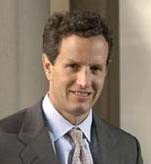By Lucy Komisar
Inter Press Service (IPS), Jan 19, 2009

U.S. Senators at Timothy Geithner’s confirmation hearing for Treasury Secretary Wednesday may want to ask him about a failure to act that is costing the U.S. a lot more than the amount he evaded on taxes.
The Federal Reserve Bank of New York, which he has led since 2003, conducts the operations on Wall Street of the Federal Reserve in Washington, the country’s central bank.
The New York Fed under Geithner’s presidency has failed to stop massive naked short selling of U.S. Treasury bonds that threatens the stability of the market and sale of the bonds.
Ironically, the scam, enabled by a lack of regulation at the behest of Wall Street brokerage houses, makes it more expensive for the U.S. to bail out those same financial institutions.
It happens this way: an individual or fund is allowed to sell bonds without owning them. This is called short selling. The seller, whose broker has generally borrowed bonds from another broker, is supposed to subsequently buy them on the market, and return them to the lender. The seller does this because he believes that the bond is going down, and he will buy them at a cheaper price than he sold them for.
Naked short selling occurs when a seller does not borrow the bonds for delivery at settlement, and therefore never has to buy them. This is called a failure to deliver, or FTD.
Meanwhile, the buyer thinks he or she has the bonds but has just an IOU. The result is a distortion of the market. Sellers sell bonds they never own or borrow, so there are more securities sold than issued by the government. These phantom bonds don’t represent money paid to the U.S. Treasury or genuine securities for buyers.
The major broker-dealers who handle bond trades like the system. They profit from fails by using clients’ money for other purposes.

The economist who has done the key work on this issue is Dr. Susanne Trimbath, who heads STP Advisory Services in Omaha. She previously worked for the Depository Trust Co, a subsidiary of Depository Trust and Clearing Corp, the U.S. clearing house for stocks and bonds.
Dr. Trimbath said, In fall of 2008, about two trillion dollars in Treasury bonds were sold but undelivered for six weeks, more than 20 percent of the daily trading volume, up from 8.6 percent in the first five months of 2008. It was a spike from 1.2 percent in the first five months of 2007.
There was excess demand for the Treasuries, she said. Rather than allow this to push the price up, the Federal Reserve Bank of New York and the DTCC allowed failures to deliver to depress the price. This affects the value of bonds held by individuals, funds and major investors such as China.
The latest figures on failures to deliver are 600-800 billion dollars. Dr. Trimbath said, The numbers look better now because the Fed threw two trillion at the market, which was used to cover these fails.
She said that Geithner failed to heed the warnings of economists at the New York Fed who in 2002 and again in 2005 analysed failures to deliver of Treasuries and recommended fines for the brokers responsible. A New York Fed white paper in April 2006 called for stricter enforcement of delivery and penalties for violations. The Bond Market Association opposed reforms, and again Geithner failed to act.
Even the current financial crisis has provoked only a faint reaction from the New York Fed. On Jan. 5, it acknowledged that, Since November, short-term interest rates have declined to unprecedented levels. It proposes a regulation to allow the buyer and seller to agree that if the buyer doesn’t receive the securities by five days after sale, the buyer could submit a claim against the seller for payment. But this can be done now and could have been done in 2002.
This is how the bond system works. The U.S. Congress authorises the federal government to issue bonds to cover the national debt. Individuals and institutions, even countries, can buy the bonds directly or through brokers. If a purchaser buys through a broker, the bonds remain in the broker’s name or the name of a central depository such as DTCC. The Treasury pays the bond’s interest to the broker, who credits the client’s account.
Since regulators don’t require the bonds to be delivered to the buyer, the broker gives clients an electronic IOU for the bond and for the interest payments as well. But if the bonds aren’t delivered by the seller, the electronic IOUs represent phantoms. Dr. Trimbath points out that, The significant result of the IOU system is that brokers are able to sell many more bonds than the Congress has authorised. The transactions are called ‘settlement failures’ or ‘failed to deliver’ events, since the broker reported bond purchases beyond what the sellers delivered. She said, There is no limit on the number of IOUs the broker can hand out…and there are usually more IOUs in circulation than there are bonds.
This artificially inflates the supply and forces bond prices down. Investors who want to buy Treasuries – to lend money to the U.S. – may instead be lending money to their brokers. Brokers get not only the commission charges for the trade, but the use of the client’s cash for the bond that was never delivered and therefore never paid for. Dr. Trimbath calculates this loss of use of funds to investors at seven billion dollars per year, conservatively.
If the broker goes out of business, clients don’t have the Treasuries, only the broker’s electronic IOUs. Dr. Trimbath, said, Who is going to get the chair when the music stops? It’s not the individual investor. I’ve seen positions just deleted from people’s statements without investors even knowing as the security they supposedly owned turns out to not exist.
This insecurity could discourage buyers of Treasuries, heralded as ultra-safe investments. And for the bond buyers, brokerage houses, and banks, it’s yet another crash-and-burn to come, said Dr. Trimbath.
Her solution: If regulators and the central clearing corporation would only enforce delivery of Treasury bonds for trade settlement – payment – at something approaching the promised, stated, contracted and agreed upon T+1 (one day after the trade), there would be an immediate surge in the price of U.S. Treasury securities.
As the prices of bonds rise, the yield falls. This falling yield then translates into a lower interest rate that the U.S. government has to pay in order to borrow the money it needs to fund the budget deficit and to refinance the existing national debt.
Brokers would have to buy real bonds to deliver to buyers. She said, That’s when the music stops.
Geithner might explain to senators why he has not stopped the billion-dollar phantom Treasury bonds scam.
Article on IPS site


Great research and great story. It points to the whole (hole) of Wall Street which has been short selling and selling phantom shares for years. In the last decade many Fortune 500 companies have had many more proxy votes than outstanding shares. Brokers have routinely sold shares they didn’t hold and never reconciled their accounts. Madoff, a former head of NASDAQ, merely did for himself what the brokerage and banking industry were doing on an institutional scale.
Geithner reminds me of that old Who song refrain, “here comes the new boss, same as the old boss.” After three years as a catamite working for Henry Kissinger, he serves in the first Bush Treasury Department and ends up as Robert Rubin’s protege (architect of Citibank’s house of cards). He’s been spoon fed for so long he has no idea who is really pulling his string.
Was it not Annette Nazareth of the SEC who said Naked Shorting (fails to deliver) does not exist? That people were just complaining that their stocks were not going up?
People have been dealing with the SEC lies and cover-ups for years.
The “cover-up people” start with the SEC so they can get a great paying job when they leave the SEC.
I know space is short, but stories about financial dealings often use terms that the public and even the writer do not really understand fully. In the case of “naked short selling” I know I do not understand it completely. Shorting generally registers in a market a negative sentiment towards a stock, it is an opinion with money backing it up.
From Investopedia:
Some analysts point to the fact that naked shorting, albeit inadvertently, may help markets stay in balance by allowing the negative sentiment to be reflected in certain stocks’ prices.
I can see in this view that short selling that does not go through because there are insufficient shares to borrow, but it does not necessary indicate criminal intent … does it?
The problem with the financial system to me is that very few Americans understand it, therefore the system of democracy and representation is perverted by the class of people who do understand it and take advantage of their place in the system due to the division of labor.
Merely complaining about this does not lead to it being fixed, and it does lead to paranoia and confusion by people unless they are educated, ie. given the power to affect things.
LK’s reply: There’s a difference between “short selling” and “naked short selling.” In “short selling” you sell shares you don’t have but that you borrow to provide the buyer. You are betting that the stock will go down so that you can subsequently buy the shares cheaper to return to the lender. In “naked short selling” you never borrow the stock and instead you provide the buyer a counterfeit.